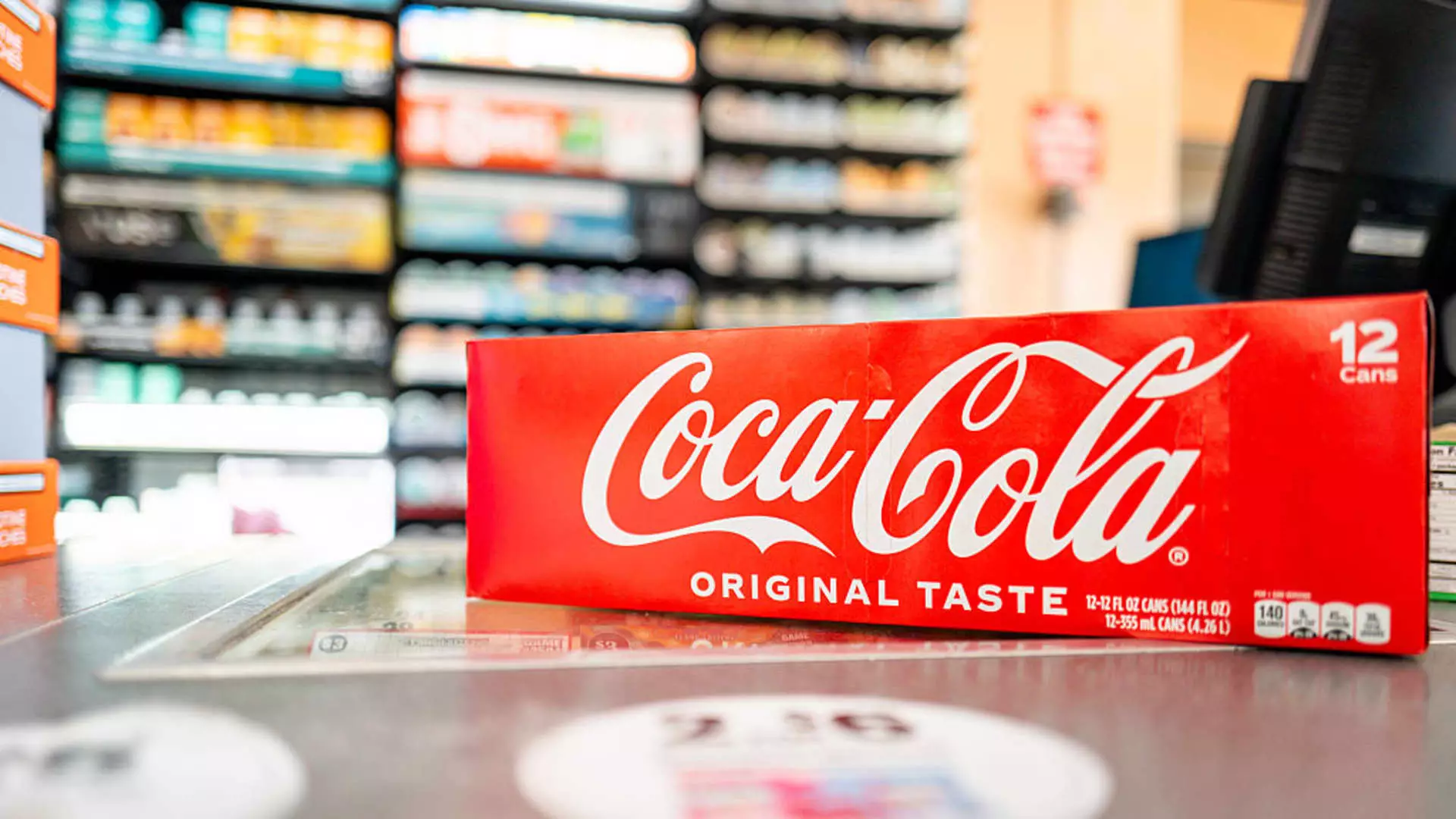Coca-Cola’s recent earnings report seemingly offers a glimmer of hope in a turbulent economic landscape. Announcing that quarterly earnings and revenue surpassed analyst expectations, the company projects an image of resilience and effective management. However, this surface-level positivity masks deeper vulnerabilities and a distorted view of true health. The fact that adjusted earnings per share climbed to 87 cents from the expected 83 cents, and revenue edged above projections at $12.62 billion, creates an aura of success. Yet, these numbers are manipulated—exclusions of asset impairments, restructuring, and other exceptional items paint a sanitized picture that distorts the real state of affairs. When we peel back the layers, Coca-Cola’s core challenge remains: declining volumes, especially outside of Europe.
Despite the quarterly “rise,” the persistent 1% decline in global unit case volume signals fragility. Growth in Europe’s Middle East and Africa does little to compensate for plunges elsewhere, notably a 2% decrease in Latin America and a 3% dip in Asia-Pacific. These figures reveal a fundamental issue—demand is waning in key markets, exposing Coca-Cola’s overreliance on superficial financial metrics rather than genuine consumer engagement. The company’s narrative of resilience conveniently ignores the stark reality: declining consumption in traditional markets and the shifting preferences of modern consumers.
The Illusion of Market Recovery and Consumer Confidence
Coca-Cola’s executives trumpet recent improvements in some challenged markets, notably North America and Europe. CEO James Quincey claims that “several markets that were weaker in the first quarter improved volumes sequentially,” suggesting potential stabilization. But this should be viewed with skepticism. The improvement is marginal—volume in North America, for instance, declined by 1% on the quarter, and the company admits that broader demand for their flagship soda remains subdued. The phrase “consumer resilience” appears more as a hopeful narrative than an accurate reflection of reality.
The truth is, consumer confidence is fragile, and economic uncertainties—rising inflation, geopolitical tensions, and social upheavals—continue to pressure ordinary households. Consumers, especially those with lower incomes, are increasingly economically strained, leading to reduced discretionary spending. Coca-Cola’s efforts at targeted marketing and affordability campaigns are band-aids on a deeper wound. It is unlikely that these strategies will turn the tide in a meaningful way amidst macroeconomic headwinds.
A disturbing aspect of Coca-Cola’s recent performance is the lingering social and reputational damage. The social media scandal involving allegations of reporting undocumented workers in the U.S., which hurt Hispanic sales earlier this year, suggests that external factors can swiftly and severely impact demand. While Quincey claims that the company has moved past this controversy, it underscores how fragile public perception and trust truly are, especially in politically sensitive markets.
Distorted Metrics and the Illusions of Innovation
Looking at product development and diversification efforts, Coca-Cola appears to be chasing trends rather than confidently leading them. The introduction of a cane sugar version of its namesake soda in the U.S., a response to the health-conscious shift, reveals a reactive rather than proactive strategy. It raises questions about the company’s ability—or willingness—to innovate meaningfully in a crowded and evolving beverage market.
Furthermore, Coca-Cola’s diversification into water, coffee, tea, and plant-based beverages offers some growth avenues, but these segments report flat or declining volumes. The 4% decline in the juice, dairy, and plant-based beverages suggests that even segmentation efforts are not insulated from declining demand. The company’s reliance on shifting product lines to buoy falling core soda volumes indicates an overdependence on surface-level innovations that may not address fundamental consumer preferences.
The reliance on organic revenue growth projections of 5-6% for 2025 feels aspirational rather than assured, especially as the company maintains a cautious outlook, narrowing its earnings growth expectations to 3%. This cautious stance hints at an awareness—perhaps even fear—of future headwinds that could easily erode what little progress has been made. The optimism masks underlying insecurity, exposing Coca-Cola’s vulnerabilities in a rapidly changing global marketplace.
A Center-Left Reflection on Corporate Power and Responsibility
From a centrist liberal perspective, Coca-Cola’s recent performance exposes the paradox of corporate resilience amidst social and economic upheaval. While the company appears to be navigating turbulent waters, its strategies seem increasingly superficial, serving shareholders’ short-term interests rather than fostering genuine, sustainable growth. The wage stagnation and economic hardships faced by ordinary consumers should serve as a wake-up call for corporations obsessed with quarterly earnings.
As a society, we must question whether firms like Coca-Cola prioritize profit at the expense of social responsibility. Their marketing campaigns, product diversification, and profit margins seem disconnected from the realities of declining consumer power and mounting social concerns. Governments and regulatory bodies should hold multinational corporations accountable for their role in shaping unhealthy consumption patterns and perpetuating economic inequality. The illusion of stability that companies project is often built on a shaky foundation—one that may falter as consumer trust wanes and societal pressures intensify.
Coca-Cola’s story is emblematic of a larger systemic issue: the tendency of global corporations to spin narratives of innovation and resilience while sidestepping the profound challenges they contribute to. The company’s need to adapt faster, address social issues honestly, and prioritize sustainable consumption over superficial growth metrics has never been more urgent. Only then can it hope to truly stabilize—not just its bottom line but its position as a responsible corporate citizen in a complex, interconnected world.

Leave a Reply